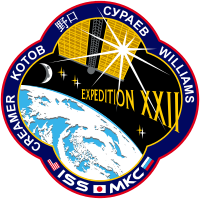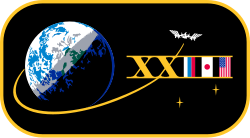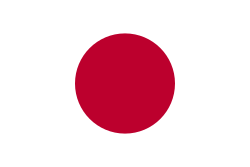Expedition 22
| Expedition 22 | |||
 | |||
| Uppdragsstatistik | |||
|---|---|---|---|
| Rymdstation: | ISS | ||
| Start: | 30 november 2009[1] | ||
| Slut: | 17 mars 2010[1] | ||
| Tid: | 167 dagar | ||
| Antal besättningsmedlemmar: | 5 st | ||
| Rymdpromenad | |||
| Antal rymdpromenader: | 1 st | ||
| Total tid: | 5 tim 44 min | ||
| Transport | |||
| Uppskjutning: | med Sojuz TMA-16, Sojuz TMA-17 | ||
| Uppskjutningsplats: | Kosmodromen i Bajkonur | ||
| Landning: | med Sojuz TMA-16, Sojuz TMA-17 | ||
| Landningsplats: | Kazakstan | ||
| Kronologi | |||
| |||

Expedition 22 var den 22:a expeditionen till Internationella rymdstationen (ISS). Expeditionen började den 30 november 2009 då huvuddelen av Expedition 21s besättning återvände till jorden med STS-129. Expeditionen avslutades den 17 mars 2010 då Maksim Surayev och Jeffrey N. Williams återvände till jorden med Sojuz TMA-16.
Besättning
| Position | Första delen (30 november - december 2009) | Andra delen (december 2009 - 17 mars 2010) |
|---|---|---|
| Befälhavare | Hans tredje rymdfärd | |
| Flygingenjör 1 | Hans första rymdfärd | |
| Flygingenjör 2 | Hans andra rymdfärd | |
| Flygingenjör 3 | Hans andra rymdfärd | |
| Flygingenjör 4 | Hans första rymdfärd | |
Referenser
- ^ [a b] NASA's Space Station Expedition 22 Arkiverad 28 september 2013 hämtat från the Wayback Machine., läst 28 augusti 2016.
Externa länkar
| |||||||||||||||||||
Media som används på denna webbplats
The 22nd Expedition to the International Space Station is dedicated to the final stages of assembly and the transition to full utilization as an orbiting laboratory. The sun, providing power and life support to the space station, shines through one of the solar arrays as the ISS orbits above Earth. The oceans and atmosphere, providing life support to Earth, are shown in all their beauty. The moon hovers in the distance as the goal of the next era of exploration. The six stars illustrate the increased capability of the crew complement. In the border are the national flags of the crew members as well as their surnames in their native languages. Expedition XXII continues the effort to acquire the knowledge necessary to extend the reach of exploration from Earth, to the moon and beyond.
The focal point of the Expedition XXIII emblem illustrates the beautiful planet Earth in the black expanse of space. The International Space Station (ISS) is shown traveling in its orbit around Earth. The ISS orbital path flies through the XXIII to show that this increment is building upon the missions that have gone on before and laying the groundwork for future missions. This illustrates the work being performed aboard the orbiting complex that will lead the way to eventual missions to the moon, Mars and beyond. The mission designation uses Roman numerals to illustrate the home nations of the crew, which are also represented by their national flags. The two stars represent the two teams that make up this expedition crew.
Expedition 21 will be the 21st long duration mission on-board the International Space Station (ISS) and the second to include six crew members.
- The central element of the patch is inspired by a fractal of six, symbolizing the teamwork of the six-person crew. From the basic element of one person, together six people form a much more complex and multifaceted entity, toward the infinity of the universe. The patch shows children, on Earth in the bright Sun, as our future and the reason we explore. The Soyuz and Shuttle are the vehicles that enable human space exploration today, while the International Space Station is leading to our next goals, the moon and Mars. The patch shape has six tips, geometrically sound yet reminiscent of a leaf, representing symmetry and ecological harmony, while the six stars in deep space represent the current crew and future exploration crews.
Expedition 22 crew members. From the left (front row) are NASA astronaut Jeffrey Williams, commander; and Russian cosmonaut Oleg Kotov, flight engineer. From the left (back row) are NASA astronaut T.J. Creamer, Russian cosmonaut Maxim Suraev and Japan Aerospace Exploration Agency (JAXA) astronaut Soichi Noguchi, all flight engineers.






